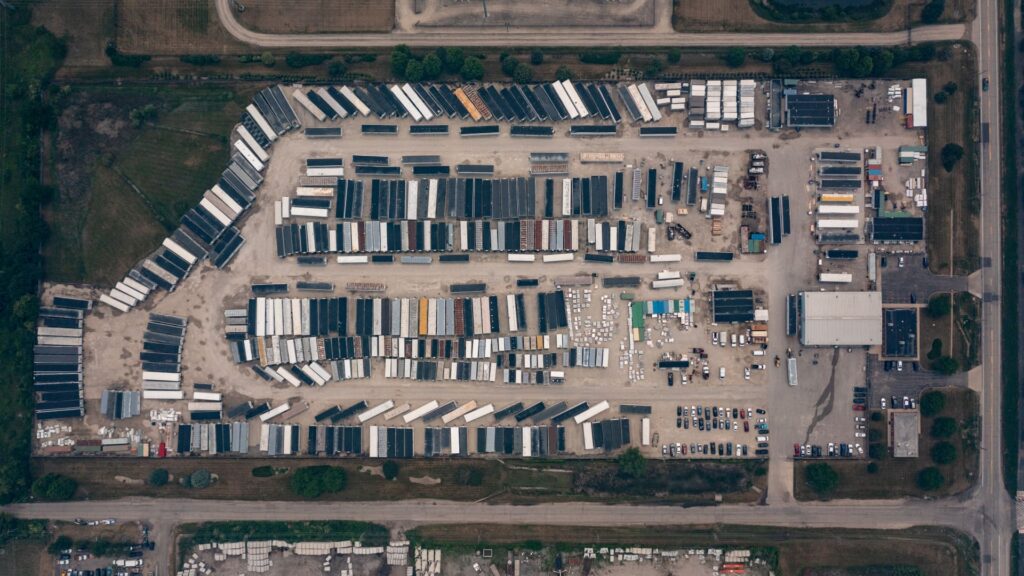Industrial outdoor storage in Elgin, Illinois.
Altera IOS Offerings
A version of this article first appeared in the CNBC Property Play newsletter with Diana Orrick. Property Play covers new and evolving opportunities for real estate investors, from individuals to venture capitalists, private equity funds, family offices, institutional investors and large publicly traded companies. Sign up to receive future editions directly to your inbox.
The rapid build-out of AI and quantum infrastructure is driving a boom in the often overlooked commercial real estate sector. Industrial outdoor storage (IOS) is suddenly seeing significant demand and rental growth while supply is scarce.
IOS consists of any type of land, paved or gravel, where businesses can park construction equipment, vehicles, containers, supplies, and anything else that can be stored outdoors. Anywhere outside of a warehouse or factory, we serve as essential back-office support for moving goods across the country. Structures may be installed, but the specification requires the structure to be less than 25% of the total space.
These sites, often located near highways, ports, and other major infrastructure, are now important hubs for data center construction. Alterra IOS, a prominent player in the field that has acquired more than 400 lots across the country, says developers park millions of dollars worth of generators, tractors and other critical equipment.
“It’s real estate hiding in plain sight,” said Leo Addimando, CEO of Alterra IOS. “There is over $1 trillion of IOS real estate in the United States, and most of it is owned by local governments. It’s shipyards, it’s airports. About $300 billion of that is owned by small, local owners, who mostly own businesses rather than institutional investors, and that’s a market to watch.”
While this sector was once thought to be a corner of the CRE market dominated by sole proprietors, it is now attracting significant investment from major corporations. In August, Zenith IOS formed a $700 million joint venture with institutional investors advised by JPMorgan Asset Management for IOS real estate nationwide. The total asset value will exceed $1.5 billion, making it one of the largest IOS portfolios in the U.S., according to a Zenith release.
Also this year, Blackstone provided a $189 million financing commitment to Alterra IOS for 49 sites and a $231 million financing commitment to Jadian Capital for a portfolio of 43 properties.
The fundamentals are attractive and are becoming more attractive, outperforming the bulk warehouse sector. While warehousing may have gained more investor attention over the past five years given the growth in e-commerce, IOS has seen double the rent growth and vacancy rates about half that of the bulk warehousing sector, according to a Newmark report.
Apartment rent in IOS has increased by 123% since 2020. Phoenix, Memphis, and Atlanta lead the way in rent growth. In some markets, IOS delivers rents similar to large warehouses when normalized on a per acre basis.
“It’s bigger than self-storage. It’s bigger than homes. It’s bigger than marinas. It’s bigger than RV parks. It’s bigger than many categories of real estate that are already institutionally owned,” Addimando said.
Altera just announced the closing of a $150 million financing facility from a fund managed by Blue Owl Capital. The facility’s initial financing was secured by 21 properties in 12 states. Funding from subsequent loan commitments will support the acquisition of Altera IOS Venture III, a closed-end fund with $925 million in equity commitments, Altera said. The deal marks Blue Owl’s first funding in the IOS space.
“Our investment in Altera reflects Blue Owl’s focus on working with market-leading operators in high-growth, resilient sectors,” said Jesse Homme, chief investment officer of Blue Owl’s real assets platform. “We see strong and sustained demand for IOS assets and believe Altera is well-positioned to lead in this evolving space.”
IOS spans an estimated 1.4 million acres in the U.S., but zoning still leaves a shortage of prime locations, Newmark said, citing users such as FedEx, JB Hunt and Maersk in the transportation and logistics space. For equipment and bulk materials storage, users include TruGreen, ABC Supply, and United Rentals, which has approximately 1,400 locations across the United States.
While fundamentals are strong and improving, the sector is not without risks. The demand for data centers is huge, but some warn it’s already overheating. Still-high interest rates, tariffs and a weak economy are also concerns, as well as more fundamental issues such as zoning.
“The biggest risk is zoning. It goes back to why land is so constrained. Not only are we not increasing IOS properties, but no one is giving zoning variances to IOS properties,” Addimando said, explaining that local governments are trying to reduce IOS acreage because if anything, it doesn’t actually create jobs or increase taxes.


